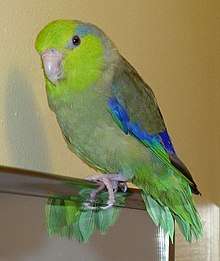Parrotlet
Parrotlets are a group of the smallest New World parrot species, comprising several genera, namely Forpus, Nannopsittaca, and Touit. They have stocky builds and short tails and are endemic to Middle and South America.[1]
| Parrotlet | |
|---|---|
 | |
| A pet male Pacific parrotlet (Forpus coelestis) | |
| Scientific classification | |
| Kingdom: | |
| Phylum: | |
| Class: | |
| Order: | |
| Family: | |
| Tribe: | |
| Genera | |
In the wild, parrotlets travel in flocks ranging in size from about four to over a hundred birds. Most species travel in flocks of about five to forty. They form lifelong, tight pair bonds with their chosen mates.
Behavior
If left alone for too long, a single parrotlet can lose some of its companion-ability. The Pacific parrotlet, in particular, does not understand that it is a tiny bird, and has little trouble challenging other animals and humans. Parrotlets in general are feisty, affectionate, and willful. Parrotlets should be housed separately due to their aggressive nature. Even bonded pairs have been known to kill or injure a mate. For this reason, most parrotlet species should not be kept in aviaries and it is best to keep them separate from other species. They will quibble and fight over object and territory, so keep that in mind.
Parrotlet species
The following species within three genera are considered to be parrotlets:
Forpus
- Mexican parrotlet (Forpus cyanopygius)
- Green-rumped parrotlet (Forpus passerinus)
- Blue-winged parrotlet (Forpus xanthopterygius)
- Turquoise-winged parrotlet (Forpus spengeli)
- Large-billed parrotlet (Forpus crassirostris)
- Spectacled parrotlet (Forpus conspicillatus)
- Dusky-billed parrotlet or Sclater's parrotlet (Forpus modestus)
- Pacific parrotlet or celestial parrotlet (Forpus coelestis)
- Yellow-faced parrotlet (Forpus xanthops)
Touit
The Touit parrotlets are a genus of parrotlets found in the Venezuela-Guyana area, the northern Andes, and Bahia. Only three of the seven species have ever been brought into aviculture, none successfully.
- Lilac-tailed parrotlet (Touit batavicus)
- Scarlet-shouldered parrotlet (Touit huetii)
- Red-fronted parrotlet (Touit costaricensis - sometimes included in T. dilectissimus)
- Blue-fronted parrotlet or red-winged parrotlet (Touit dilectissimus)
- Sapphire-rumped parrotlet (Touit purpuratus)
- Brown-backed parrotlet (Touit melanonota)
- Golden-tailed parrotlet (Touit surdus)
- Spot-winged parrotlet (Touit stictopterus)
Nannopsittaca
There are only two species in the genus Nannopsittaca.
- Tepui parrotlet (Nannopsittaca panychlora)
- Manu parrotlet or Amazonian parrotlet (Nannopsittaca dachilleae)
References
- Forshaw, Joseph (2006). Parrots of the World. Princeton, New Jersey: Princeton University Press. p. 123. ISBN 0-691-09251-6.